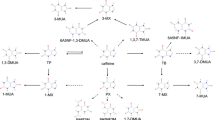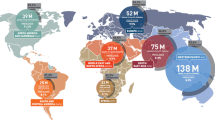Abstract
Diabetes type 2, caused mainly by insulin resistance, is growing in incidence worldwide. In addition to being a major public health concern, type 2 diabetes is also a risk factor for dementia, including Alzheimer’s disease type dementia. Coffee consumption is reported to have protective effects in both diabetes and Alzheimer’s disease. We review here the reported beneficial effects of coffee in both disease conditions and the previously identified active ingredients of coffee. Furthermore, we revisit our recent findings of improved glucose utilization in the periphery and in the brain in a mouse model of high-fat diet induced type 2 diabetes after treatment with a decaffeinated green coffee preparation. Overall, consumption of coffee appears to improve diabetes and reduce the risk of dementia, although future studies are required to further identify the active components and the type of coffee that is most effective in addressing these conditions.
Similar content being viewed by others
References
International Diabetes Federation, IDF Diabetes Atlas, cited 2013 August 27, 5th Edition, 2012, available from: http://www.idf.org/diabetesatlas/5e/Update2012
World Health Organization, Diabetes Fact Sheet, 1999, cited 2013 August 27, available from: http://www.who.int/mediacentre/factsheets/fs312/en/
Alberti K. G., Zimmet P. Z., Definition, diagnosis and classification of diabetes mellitus and its complications. Part 1: diagnosis and classification of diabetes mellitus provisional report of a WHO consultation, Diabet. Med., 1998, 15, 539–553
Vagelatos N. T., Eslick G. D., Type 2 diabetes as a risk factor for Alzheimer’s disease: the confounders, interactions, and neuropathology associated with this relationship, Epidemiol. Rev., 2013, 35, 152–160
Alzheimer’s Association, 2013 Alzheimer’s disease facts and figures, cited 2013 August 27, available from: http://www.alz.org/downloads/facts_figures_2013.pdf
Butt M. S., Sultan M. T., Coffee and its consumption: benefits and risks, Crit. Rev. Food Sci. Nutr., 2011, 51, 363–373
van Dam R. M., Hu F. B., Coffee consumption and risk of type 2 diabetes: a systematic review, JAMA, 2005, 294, 97–104
Huxley R., Lee C. M., Barzi F., Timmermeister L., Czernichow S., Perkovic V., et al., Coffee, decaffeinated coffee, and tea consumption in relation to incident type 2 diabetes mellitus: a systematic review with meta-analysis, Arch. Intern. Med., 2009, 169, 2053–2063
Muley A., Muley P., Shah M., Coffee to reduce risk of type 2 diabetes? A systematic review, Curr. Diabetes Rev., 2012, 8, 162–168
Reunanen A., Heliovaara M., Aho K., Coffee consumption and risk of type 2 diabetes mellitus, Lancet, 2003, 361, 702–703, author reply 703
Saremi A., Tulloch-Reid M., Knowler W. C., Coffee consumption and the incidence of type 2 diabetes, Diabetes Care, 2003, 26, 2211–2212
Floegel A., Pischon T., Bergmann M. M., Teucher B., Kaaks R., Boeing H., Coffee consumption and risk of chronic disease in the European Prospective Investigation into Cancer and Nutrition (EPIC) — Germany study, Am. J. Clin. Nutr., 2012, 95, 901–908
Pereira M. A., Parker E. D., Folsom A. R., Coffee consumption and risk of type 2 diabetes mellitus: an 11-year prospective study of 28 812 postmenopausal women, Arch. Intern. Med., 2006, 166, 1311–1316
van Dam R. M., Willett W. C., Manson J. E., Hu F. B., Coffee, caffeine, and risk of type 2 diabetes: a prospective cohort study in younger and middle-aged U.S. women, Diabetes Care, 2006, 29, 398–403
Robinson L. E., Savani S., Battram D. S., McLaren D. H., Sathasivam P., Graham T. E., Caffeine ingestion before an oral glucose tolerance test impairs blood glucose management in men with type 2 diabetes, J. Nutr., 2004, 134, 2528–2533
Kogure A., Sakane N., Takakura Y., Umekawa T., Yoshioka K., Nishino H., et al., Effects of caffeine on the uncoupling protein family in obese yellow KK mice, Clin. Exp. Pharmacol. Physiol., 2002, 29, 391–394
Yoshioka K., Yoshida T., Kamanaru K., Hiraoka N., Kondo M., (1990). Caffeine activates brown adipose tissue thermogenesis and metabolic rate in mice, J. Nutr. Sci. Vitaminol. (Tokyo), 1990, 36, 173–178
Welsch C. A., Lachance P. A., Wasserman B. P., Dietary phenolic compounds: inhibition of Na+-dependent D-glucose uptake in rat intestinal brush border membrane vesicles, J. Nutr. 1989, 119, 1698–1704
Hemmerle H., Burger H. J., Below P., Schubert G., Rippel R., Schindler P. W., et al., Chlorogenic acid and synthetic chlorogenic acid derivatives: novel inhibitors of hepatic glucose-6-phosphate translocase, J. Med. Chem., 1997, 40, 137–145
Prabhakar P. K., Doble M., Synergistic effect of phytochemicals in combination with hypoglycemic drugs on glucose uptake in myotubes, Phytomedicine, 2009, 16, 1119–1126
Lee K. J., Jeong H. G., Protective effects of kahweol and cafestol against hydrogen peroxide-induced oxidative stress and DNA damage, Toxicol. Lett., 2007, 173, 80–87
Bakuradze T., Lang R., Hofmann T., Stiebitz H., Bytof G., Lantz I., et al., Antioxidant effectiveness of coffee extracts and selected constituents in cell-free systems and human colon cell lines, Mol. Nutr. Food Res., 2010, 54, 1734–1743
Hu N., Yu J. T., Tan L., Wang Y. L., Sun L., Nutrition and the risk of Alzheimer’s disease, Biomed. Res. Int., 2013, 524820
Barranco Quintana J. L., Allam M. F., Del Castillo A. S., Navajas R. F. C., Alzheimer’s disease and coffee: a quantitative review, Neurol. Res., 2007, 29, 91–95
Lindsay J., Laurin D., Verreault R., Hebert R., Helliwell B., Hill G. B., et al., Risk factors for Alzheimer’s disease: a prospective analysis from the Canadian Study of Health and Aging, Am. J. Epidemiol., 2002, 156, 445–453
Eskelinen M. H., Ngandu T., Tuomilehto J., Soininen H., Kivipelto M., Midlife coffee and tea drinking and the risk of late-life dementia: a population-based CAIDE study, J. Alzheimers Dis., 2009, 16, 85–91
Cao C., Loewenstein D. A., Lin X., Zhang C., Wang L., Duara R., et al., High blood caffeine levels in MCI linked to lack of progression to dementia, J. Alzheimers Dis., 2012, 30, 559–572
Cao C., Wang L., Lin X., Mamcarz M., Zhang C., Bai G., et al., Caffeine synergizes with another coffee component to increase plasma GCSF: linkage to cognitive benefits in Alzheimer’s mice, J. Alzheimers Dis., 2011, 25, 323–335
Gelber R. P., Petrovitch H., Masaki K. H., Ross G. W., White L. R., Coffee intake in midlife and risk of dementia and its neuropathologic correlates, J. Alzheimers Dis., 2011, 23, 607–615
Chu Y. F., Chang W. H., Black R. M., Liu J. R., Sompol P., Chen Y., et al., Crude caffeine reduces memory impairment and amyloid beta(1–42) levels in an Alzheimer’s mouse model, Food Chem., 2012, 135, 2095–2102
Cao C., Cirrito J. R., Lin X., Wang L., Verges D. K., Dickson A., et al., Caffeine suppresses amyloid-beta levels in plasma and brain of Alzheimer’s disease transgenic mice, J. Alzheimers Dis., 2009, 17, 681–697
Arendash G. W., Mori T., Cao C., Mamcarz M., Runfeldt M., Dickson A., et al., Caffeine reverses cognitive impairment and decreases brain amyloid-beta levels in aged Alzheimer’s disease mice, J. Alzheimers Dis., 2009, 17, 661–680
Arendash G. W., Schleif W., Rezai-Zadeh K., Jackson E. K., Zacharia L. C., Cracchiolo J. R., et al., Caffeine protects Alzheimer’s mice against cognitive impairment and reduces brain beta-amyloid production, Neuroscience, 2006, 142, 941–952
Fredholm B. B., Battig K., Holmen J., Nehlig A., Zvartau E. E., Actions of caffeine in the brain with special reference to factors that contribute to its widespread use, Pharmacol. Rev., 1999, 51, 83–133
Canas P. M., Porciuncula L. O., Cunha G. M., Silva C. G., Machado N. J., Oliveira J. M., et al., Adenosine A2A receptor blockade prevents synaptotoxicity and memory dysfunction caused by beta-amyloid peptides via p38 mitogen-activated protein kinase pathway, J. Neurosci., 2009, 29, 14741–14751
Angulo E., Casado V., Mallol J., Canela E. I., Vinals F., Ferrer I., et al., A1 adenosine receptors accumulate in neurodegenerative structures in Alzheimer disease and mediate both amyloid precursor protein processing and tau phosphorylation and translocation, Brain Pathol., 2003, 13, 440–451
Dostal V., Roberts C. M., Link C. D., Genetic mechanisms of coffee extract protection in a Caenorhabditis elegans model of betaamyloid peptide toxicity, Genetics, 2010, 186, 857–866
Evans M. J., Scarpulla R. C., Interaction of nuclear factors with multiple sites in the somatic cytochrome c promoter. Characterization of upstream NRF-1, ATF, and intron Sp1 recognition sequences, J. Biol. Chem., 1989, 264, 14361–14368
Trinh K., Andrews L., Krause J., Hanak T., Lee D., Gelb M., et al., Decaffeinated coffee and nicotine-free tobacco provide neuroprotection in Drosophila models of Parkinson’s disease through an NRF2-dependent mechanism, J. Neurosci., 2010, 30, 5525–5532
Tohda C., Kuboyama T., Komatsu K., Search for natural products related to regeneration of the neuronal network, Neurosignals, 2005, 14, 34–45
Kwon S. H., Lee H. K., Kim J. A., Hong S. I., Kim H. C., Jo T. H., et al., Neuroprotective effects of chlorogenic acid on scopolamine-induced amnesia via anti-acetylcholinesterase and anti-oxidative activities in mice, Eur. J. Pharmacol., 2010, 649, 210–217
Cho E. S., Jang Y. J., Hwang M. K., Kang N. J., Lee K. W., Lee H. J., Attenuation of oxidative neuronal cell death by coffee phenolic phytochemicals, Mutat. Res., 2009, 661, 18–24
Ho L., Varghese M., Wang J., Zhao W., Chen F., Knable L. A., et al., Dietary supplementation with decaffeinated green coffee improves diet-induced insulin resistance and brain energy metabolism in mice, Nutr. Neurosci., 2012, 15, 37–45
Ho L., Qin W., Pompl P. N., Xiang Z., Wang J., Zhao Z., et al., Dietinduced insulin resistance promotes amyloidosis in a transgenic mouse model of Alzheimer’s disease, FASEB J., 2004, 18, 902–909
Author information
Authors and Affiliations
Corresponding author
About this article
Cite this article
Varghese, M., Ho, L., Wang, J. et al. Green coffee as a novel agent for Alzheimer’s disease prevention by attenuating diabetes. Translat.Neurosci. 5, 111–116 (2014). https://doi.org/10.2478/s13380-014-0213-y
Received:
Accepted:
Published:
Issue Date:
DOI: https://doi.org/10.2478/s13380-014-0213-y




